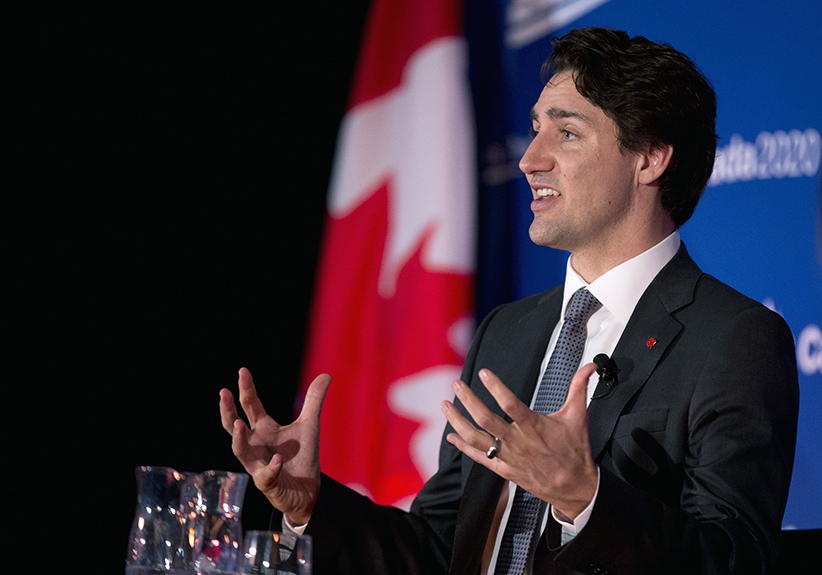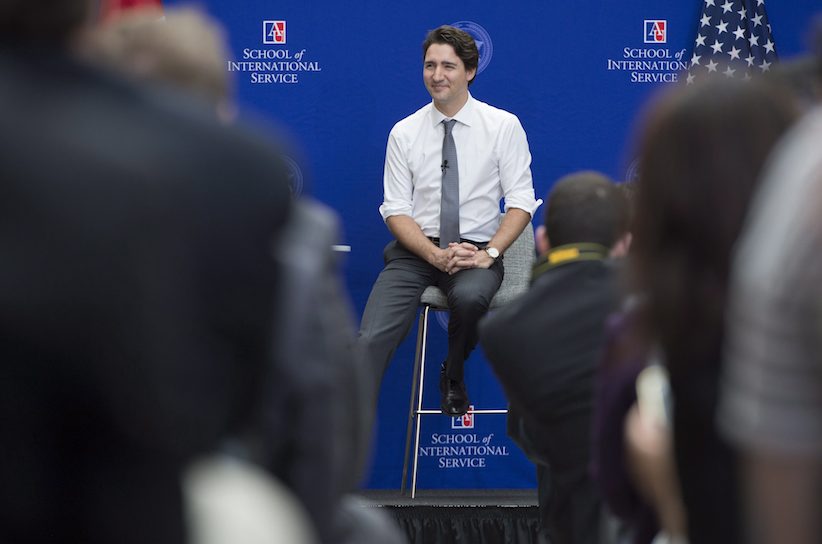Justin Trudeau takes Ottawa’s debates to Washington
‘It’s me sitting here as Prime Minister of Canada, not Stephen Harper.’
Share

Critics of Justin Trudeau’s three-day trip to Washington have an obvious point: the Prime Minister didn’t make much of a dent in the wall-to-wall coverage of the U.S. presidential primaries, and especially of Donald Trump’s amazing candidacy. But often during this trip, it seemed Trudeau’s admirers also had a hard time viewing him through any lens but the primaries.
Every time Trudeau took questions—from reporters on Thursday in the White House Rose Garden, Friday from preternaturally well-briefed students at the American University—he was asked specifically about Trump. Usually the questions were awkwardly jokey, and more than once they were about the notion that Americans might flee northward at the prospect of a Trump presidency.
(President Barack Obama jumped on that question the first time it was asked, before Trudeau could speak, and reminded everyone that the that-does-it-I’m-moving-to-Canada folktale had featured in commentary around his own election in 2008, and indeed in most recent presidential contests. By Friday, Trudeau was giving a version of the same argument himself.)
But more generally, Trudeau’s assorted gentle interrogators often seemed to value him because he offers evidence that voters won’t always select the angriest candidate or the one who shouts the loudest. At American University, whose school for international service was founded in response to an Eisenhower speech urging Americans to “wage peace,” most of the questions were variations on: “You’re so cool. How did you get to be so cool?” The presence of Indigenous MPs and Sikhs in his cabinet was lauded, as was his commitment to gender parity, his policy of accepting 25,000 Syrian refugees, and other policies that would perhaps not normally be endorsed by a president Trump.
Related from macleans.ca: Justin Trudeau’s lobby day in Washington
Trudeau was eager to second these emotions, and to offer up a succession of sometimes shopworn odes to inclusiveness. But twice at a lunch organized by the very Liberal-friendly Ottawa think tank Canada 2020 and by its Washington counterpart, the Center for American Progress, I thought Trudeau pushed the argument to intriguing lengths.
First, on the Syrian refugees. Welcoming all those newcomers isn’t only “the right thing to do,” Trudeau said. It’s also in Canada’s longer-term self-interest.
“It’s also about strengthening our communities,” he said. “Bringing over families who will get jobs and build and create and contribute and create better futures for their kids than they could have anywhere else in the world, or certainly than they could have back home. And therefore with their hard work, with their delight at the opportunities we’re handing them, they’re going to boost our economy as well, and remind us and give us a better perspective on the world that will be very useful in the coming years. Canadians got that.”
Indeed, even the Conservatives—whom Trudeau insisted on calling “our right wing” throughout his remarks, perhaps to spare American listeners the burden of remembering more than one party label—did not offer significant resistance to Trudeau’s refugee policy after the election. “I have to say, even our right wing hasn’t been overly fear-generating around this or opposed to it,” he said.
“They highlighted concerns around security that aren’t unreasonable, certainly concerns that we shared … We had a very positive response to [the refugees] right across the country because Canadians felt they could be part of this narrative that was going to, not just remind us of the kind of country we are, but contribute to a positive step for our communities in the coming years. Because the story of our country—the story of this country—is one of people seeking better opportunities for themselves and their children by crossing oceans and starting anew. That work’s not finished yet.”

The other striking moment came when Trudeau raised, by himself, his decision to repeal the provisions in the Conservatives’ “Strengthening Canadian Citizenship Act,” C-24, that stripped some convicted terrorists of their Canadian citizenships.
“One of the things the right wing had done was put forward a bill that took away the citizenship of convicted terrorists,” he said. “A number of countries have done that around the world. It seems like a fairly obvious thing to try and do. If someone’s gonna commit an act of war, an act of terrorism against the country, they probably shouldn’t deserve to keep Canadian citizenship if they’re doing that.”
This is indeed a decent paraphrase of the arguments Conservatives made in support of C-24. Trudeau said his opponents “felt they were on very, very safe ground” with their policy.
“The problem is, as you scratch into that a little deeper, you realize it only really applies to citizens who have, or could have, a dual nationality. So a kid who was born in Canada, and only has a Canadian citizenship—but whose parents were born, for example, in Pakistan—could lose his citizenship if he committed an act of terror, [whereas] a kid who was tenth-generation Canadian homegrown terrorist could never lose his citizenship. Suddenly we’d made citizenship conditional on good behaviour. Or on non-heinous behaviour, which comes down to the same thing. And that devalues the citizenship: two classes of citizen.”
More from macleans.ca: Seven things you need to know about the state dinner
Trudeau’s tone suggested he knew this was not, on the face of it, a winning issue for him. “It came to the point where, in one of our largest debates, I was standing on stage against the former prime minister. He was telling people that I was willing to stand up and restore the citizenship of the one Canadian who, under this law, had had his citizenship taken away.
“He knew he had me on that one. I’m actually standing there defending the right of a Canadian—stripped of his citizenship for terrorism—to become, once again, a Canadian citizen. I stood there, and I defended that principle, that you should not be able to take away citizenship from anyone. Our government would be, because we’d reverse that law, restoring the citizenship of someone who was convicted of terrorism in Canada.
“That’s a perfect narrative for the politics of fear and aggression. Yet it’s me sitting here as Prime Minister of Canada, not Stephen Harper.”
The story was, of course, catnip for Trudeau’s centre-left audience. But it also suggests the depth of the gulf separating Trudeau from—well, from vintage-2015 Stephen Harper; it will be up to the Conservative party to decide how it wants to litigate such debates in the future. All politics is local, as Tip O’Neill liked to say. A Canadian prime minister visits Washington, where the locals regard him as a rebuttal to a presidential candidate, and every story he tells them recalls last year’s debates, or sets up next year’s.